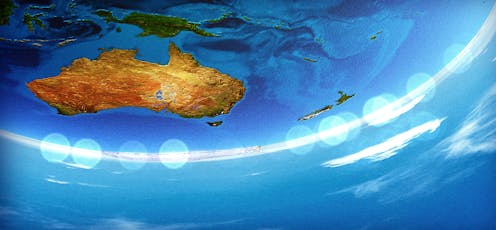COVID-19 provides a rare chance for Australia to set itself apart from other regional powers. It can create a Pacific 'bubble'
- Written by Peter Draper, Executive Director: Institute for International Trade, University of Adelaide

For a short time Australia has an unrivalled opportunity to set itself apart from donors to the Pacific including China, Japan and the European Union[1].
As Victoria’s current COVID-19 spike shows, it will take Australia some time to open its borders to the world and allow residents to travel wherever they like.
But there’s no reason why it shouldn’t open its borders to some parts of the world sooner than others, especially those in which it has a special interest and in which the spread of coronavirus is slowing[2].
Australia and New Zealand have been talking about setting up a trans-Tasman “travel bubble[3]” for some time.
It would allow quarantine-free travel between two geographically-isolated island nations that face little risk of outside infection.
Fiji[4] has already expressed interest in joining, extending the bubble.
Read more: Why a trans-Tasman travel bubble makes a lot of sense for Australia and New Zealand[5]
Throughout the South Pacific, youth unemployment averages over 23%. Tourism accounts for as much as half[6] of gross domestic product and up to one in four jobs[7].
A bubble that extended beyond tourism to trade, education, and guest workers could help the Pacific (and holidaying Australians) in a way that the generous loans available from powers such as China could not.
Much of the architecture for a trade and tourism bubble is already in place.
The trade and investment agreement known as the Pacific Agreement on Closer Economic Relations (PACER) Plus[8] concluded in Brisbane on 20 April 2017.
The agreement encompasses Australia, New Zealand and nine Pacific island countries: the Cook Islands, Kiribati, Nauru, Niue, Samoa, Solomon Islands, Tonga, Tuvalu and Vanuatu. It has been ratified by five of the members and will come into force when it is ratified by eight.
For the Pacific Islands, a “bubble” would provide a major boost to economic development and recovery from the crisis.
It could help relieve the social pressures that come from growing youth populations and attendant unemployment and minimise the danger of future political crises and associated need for Australian interventions and financial support.
The long-term importance of continued access to quality education, vocational and tertiary, for Pacific Islander youth is essential. Hard-pressed Australian Universities and vocational education suppliers would benefit too.
For Australia (and New Zealand) it could provide relief from isolation via travel to attractive destinations. Perhaps more importantly, it could help fill gaps in Australia’s skill set by supplying tradespeople and agricultural workers to meet genuine shortages.
It would also help maintain Australia’s business and investment interests in the Pacific. PACER Plus implementation would reinforce these gains. It will facilitate more investment and trade opportunities, in goods and services.
Read more: How might coronavirus change Australia's 'Pacific Step-up'?[9]
Unfortunately, Fiji and Papua New Guinea have not yet signed PACER Plus, for various reasons.
It is unfortunate because trade and investment flows are their best long-term route to advancement. There are strong economic complementarities between Australia and Pacific nations, especially for Papua New Guinea.
A bubble, implemented when the health situation allows, would be supported by many Pacific islands nations and most likely their regional coordinating body, the Pacific Island Forum Secretariat.
Together with PACER Plus implementation, it would benefit Australia and benefit the region in a way that aid and infrastructure support from big powers can not.
Read more: Sun, sand and uncertainty: the promise and peril of a Pacific tourism bubble[10]
References
- ^ China, Japan and the European Union (pacificaidmap.lowyinstitute.org)
- ^ slowing (www.theguardian.com)
- ^ travel bubble (theconversation.com)
- ^ Fiji (www.afr.com)
- ^ Why a trans-Tasman travel bubble makes a lot of sense for Australia and New Zealand (theconversation.com)
- ^ half (www.researchgate.net)
- ^ one in four jobs (www.researchgate.net)
- ^ Pacific Agreement on Closer Economic Relations (PACER) Plus (www.dfat.gov.au)
- ^ How might coronavirus change Australia's 'Pacific Step-up'? (theconversation.com)
- ^ Sun, sand and uncertainty: the promise and peril of a Pacific tourism bubble (theconversation.com)
Authors: Peter Draper, Executive Director: Institute for International Trade, University of Adelaide




